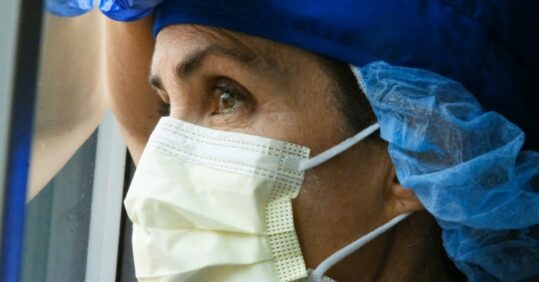Unison: Don’t stay silent if your employer isn’t addressing your concerns

Unison national officer for nursing Stuart Tuckwood points out the challenges now and in the future for nurses during the Covid-19 pandemic, and an employer’s responsibilities to their staff.
The response of hospitals and intensive care units to Covid-19 has been the main media focus since the pandemic began. But the entire health system including community and primary care has been tackling this global health crisis through extraordinary team working.
Unison is the UK’s largest health and social care union and our members include community nurses, midwives, carers, allied health professionals and other primary care staff working in hospitals, care homes, GP practices and many other settings.
Our key priority is ensuring all staff are safe, well paid and supported. Immense pressures faced by the workforce are set to increase as wider NHS activity restarts and more treatments and care are delivered in communities. Unison is committed to ensuring all staff receive a better deal and are supported to deliver their vital services.
What have been the key challenges for nurses in primary care during the pandemic?
Like the rest of the NHS and social care, GP practices and other community facilities had to reorganise quickly to protect staff and maintain social distancing. This was while continuing to offer services and meeting new challenges. Teams across the country have shown incredible ingenuity, adapting to virtual ways of working and supporting vulnerable patients.
Personal protection equipment supply and access for practices and other facilities has been a major concern. Guidance on testing, shielding and sick pay has also been at times painfully slow and inconsistent. Unison organisers and workplace representatives have worked hard to resolve many of the resulting problems.
Related Article: Tell us what practice nursing means to you and potentially win £1,000
Many primary care staff have struggled to maintain their own health and wellbeing. Retaining nurses and practice staff was a challenge before the pandemic and looks set to become harder.
What practical guidance and tips exist for these nurses to meet these challenges?
Primary care staff must be protected by working in ways that reduce any chance of contracting Covid-19. For staff at highest risk, this should mean working virtually wherever possible, and appropriate PPE must be provided where public contact is unavoidable.
Safety has to be based on risk assessments and employers including GP practices have a legal duty to carry these out for each employee.
Staff shouldn’t be compelled into physical work if vulnerable, self-isolating or sick with Covid-19. NHS England have confirmed that in these circumstances practice staff should continue receiving full pay. If this isn’t the case, contact your union representative.
Black workers have been hit particularly hard by Covid-19. Unison has campaigned for black staff to receive thorough, sensitive risk assessments and pay-protection if they are redeployed for their own safety.
Many registrants have faced dilemmas in their professional practice. Unison professional guidance can be found on our website or by accessing our virtual webinars. The unions’ professional services unit offers support and representation to members facing issues with regulators.
There are a range of services available to staff in England who are struggling with mental health issues. One resource is the confidential helpline staffed by the Samaritans.
Don’t stay silent. Do contact your Unison branch for support with raising concerns or whistleblowing if your line manager isn’t addressing your concerns.
Related Article: MPs vote to legalise assisted dying in England and Wales
Pay is also on the agenda. Unison is calling for an early, significant rise for all NHS staff including in primary care. Now is the time for practice staff to raise this with employers so any pay rise agreed for the NHS is matched at least. Unison members can contact their local branches for support.
What does the future for these nurses look like?
The consequences of Covid-19 will be felt for decades. Primary care staff will be required to support survivors and coordinate implementation of any future vaccine. Mental health conditions are also set to rise dramatically because of lockdown and the stress the entire population has experienced.
The expansion of primary care already required substantial investment in the workforce to meet ambitious goals. Covid-19 means these efforts must be redoubled.
The recently published NHS People Plan has signalled huge investment is needed in staff, with flexible working to be the default option for staff. Similar focus is needed in primary care. Maintaining a work-life balance can be very challenging – flexibility and support must be available for all who need them. Otherwise we risk losing more valued colleagues.
Pay, annual leave and terms and conditions must be improved, both to retain staff and to make nursing a better valued, attractive career opportunity.
Related Article: Super-regulator finds ‘weaknesses’ across NMC’s regulatory functions
And that is about more than just pay and conditions.
Continuing Professional Development (CPD) funding has been squeezed because of austerity, but reintroducing individual CPD budgets for nurses and midwives was a welcome move. These must be built upon, and opportunities and exciting futures provided for those in primary care.
Unison campaigns on all these issues and offers professional representation and legal advice. But union organising in GP practices and community settings is challenging. We’re stronger and more likely to win when we have more members and more representatives in every workplace. It might be worth becoming a Unison member or steward if you are interested in helping us support the teams you work in.

See how our symptom tool can help you make better sense of patient presentations
Click here to search a symptom


Staff shouldn’t be compelled into physical work if vulnerable, self-isolating or sick with Covid-19. NHS England have confirmed that in these circumstances practice staff should continue receiving full pay.



